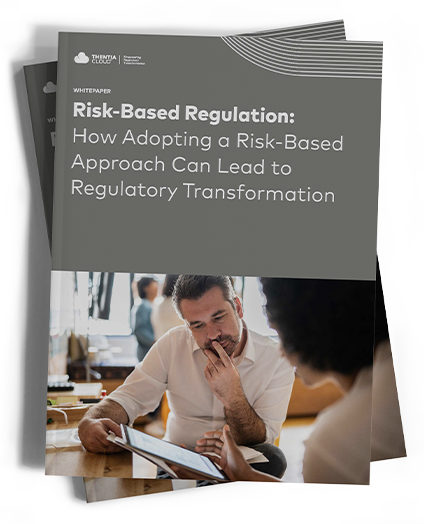As we discussed previously, regulators must maintain trust with the public to protect the integrity of their respective professions and keep the privilege of self-regulation. One way to do this is to have robust investigation and disciplinary processes in place so that the public knows that any allegations of misconduct against a practitioner will be taken seriously. But what does the response process look like when a licensee faces disciplinary charges?
Natasha Giuffre, principal advisor, Legal & Regulatory Affairs at Thentia Cloud has extensive experience in this arena. Giuffre served as discipline counsel at the Law Society of Ontario for several years, where she represented the organization in hearings, appeals, and judicial reviews. She walked us through the disciplinary process to explain the basics of how regulators respond to allegations of misconduct, and what comes next.
Complaints must fit within regulator’s mandate to warrant investigation
When a complaint is made, the regulator must first determine if the complaint fits within its mandate, and if the remediation sought by the complainant is within its ability to produce. In general, regulators are only able to respond to complaints that concern a practitioner’s competence and capacity. “Regulators need to ensure that they’re supporting a high quality of practice and competence of practitioners, so in cases where there is a prosecution, the prosecution is about whether or not the member should still have a license,” Giuffre explains. However, for situations where a complainant is seeking money from a practitioner, they would need to go through separate legal processes.
If a complaint is judged to be within the regulator’s mandate, it is sent to be investigated, either in-house or by a third party. What powers the regulator has during the investigation is determined by the governing legislation, and some have more far-reaching powers than others. Law regulators, for example, have the authority to search a lawyer’s office and seize papers/files as evidence. Other agencies, such as regulators that oversee personal care professions like hairstylists and estheticians, may have the authority to conduct inspections and audits.
Disciplinary process resembles a normal legal prosecution, with some differences
If the investigation finds sufficient evidence to proceed, the case is handed off to prosecution, which is conducted either in-house or transferred to an outside law firm or the State, depending on the regulator and jurisdiction. Some regulators require permission from a council or board before proceeding with a prosecution, but others don’t. Rules for the proceedings also vary according to the adjudicative body, but for the most part, Giuffre says that the process looks a lot like a normal legal prosecution, including due process requirements like disclosure (where evidence must be handed over to the defence team).
After disclosure, resolution discussions (also called settlement discussions or pre-hearing conferences) take place where the parties meet with an independent adjudicator to determine next steps. If the defense and prosecution teams agree that misconduct did take place, then the parties will discuss what penalty would be appropriate. But if they disagree, they must decide on details for the formal adjudication of the case (i.e., witnesses, evidence, length of time needed for the proceedings, etc.).
The composition of the adjudicating body is one aspect of disciplinary hearings that differs substantially from civilian court proceedings. In a regular court of law, the defendant will have their case decided by a judge or jury of their peers. However, for practitioners accused of misconduct, the makeup of the adjudicating body is determined by the regulator’s governing legislation. “So for example, you could have a panel of three people deciding things, composed of members of the profession,” says Giuffre. “Or it might have to include a layperson, so a person who is a member of the public and not a member of the profession.”
The disciplinary hearing against a licensee proceeds like a regular court of law, following the rules of civil procedure in the particular jurisdiction unless specific rules are set out in the regulator’s governing legislation. Like a civilian court case, the practitioner is innocent until proven guilty, and the onus is on the prosecution to meet a high standard of probability that the act in question did occur.
As for the length of time it takes for a decision to be made, Giuffre says it varies. “Sometimes you get a decision on the spot and sometimes you don’t,” she says. “Sometimes it takes many, many months to get a decision.”
Criminal conduct in a practitioner’s personal life can net disciplinary charges
But what happens to practitioners while their case is being decided? In most cases, Giuffre says they are still able to practice, although sometimes they will be subject to restrictions (such as supervision requirements). But there are exceptions. In rare situations where the allegations are serious (such as sexual assault or misappropriation of client funds) and the public could be put at risk from the licensee continuing to practice, the regulator may impose interim or interlocutory measures (commonly a license suspension) until the matter is settled. However, the criminal justice system decides whether criminal offences occurred; the regulator determines whether a criminal offence amounts to professional misconduct or conduct unbecoming. In most professions, practitioners are obligated to disclose criminal convictions to their regulator – not only at the time of their license application, but for the duration of their careers. Even if it isn’t a serious or violent crime – for example, a “crime of dishonesty” such as mail fraud – it could endanger their license.
And if a licensee is found to be guilty, what happens next? “It really does depend on what conduct or misconduct has been found and the personal circumstances of the licensee,” says Giuffre. But penalties can vary widely, ranging from reprimands (a stern talking to), to license suspensions, or even full license revocations. However, like regular court proceedings, common law principles apply, which means that there is some predictability of the penalty based on the outcomes of similar cases that have occurred before.
In general, Giuffre notes that disciplinary charges against licensees are rare and prosecutions are even rarer, as regulators can employ measures aimed at remediation as a first response. However, in instances where misconduct warrants a formal investigation and prosecution, it’s imperative that the regulator carries out these processes in an impartial and transparent way; not only to hold licensees accountable, but also to ensure that the public can trust the regulator (and other members of the profession) to act in the public interest.
Ariel Visconti is a Content Writer at Thentia with extensive experience writing about academic research, government and politics, emerging technologies, and innovation.












